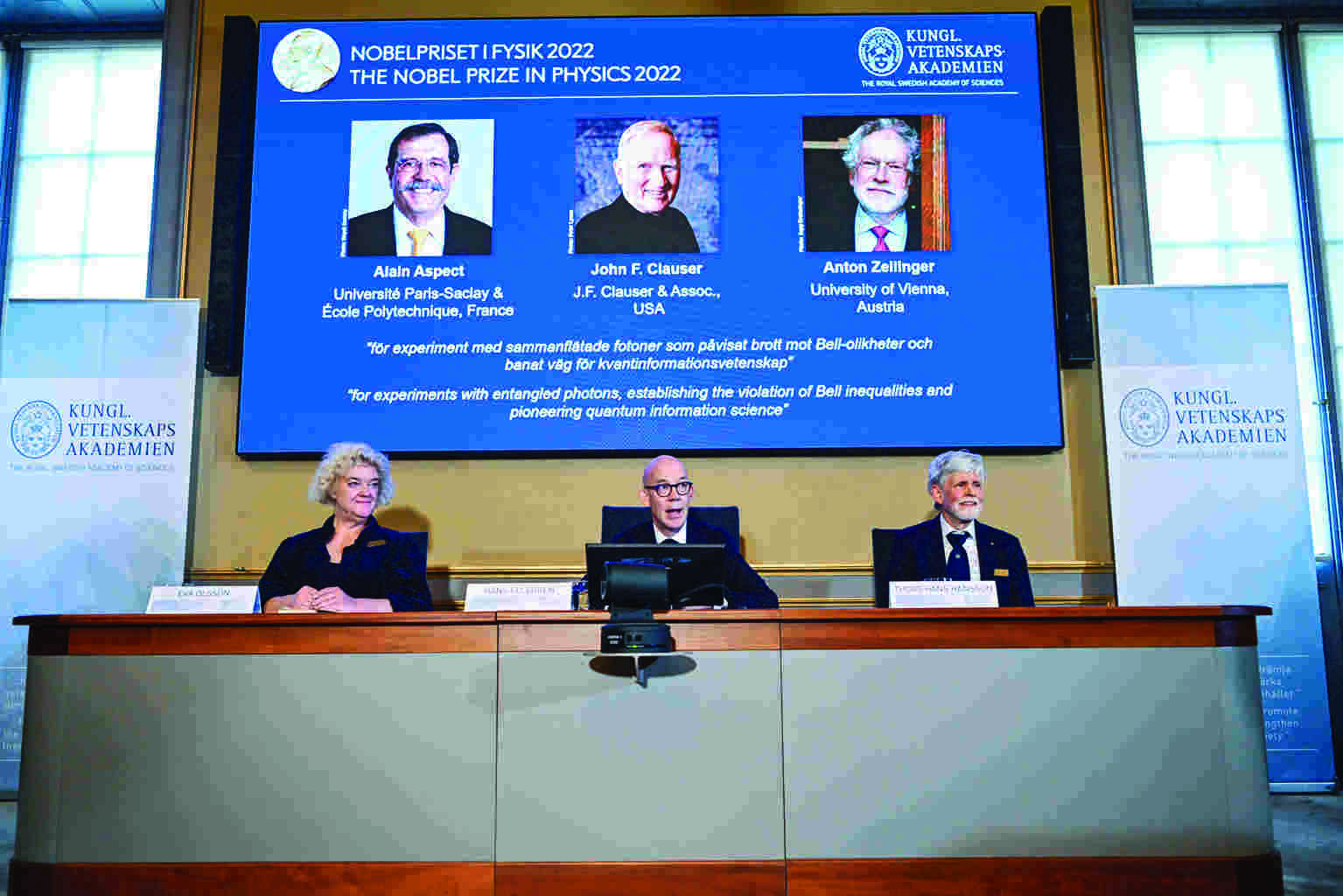Three scientists share Nobel Prize in physics for work on quantum information science

Stockholm: Three scientists jointly won this year's Nobel Prize in physics on Tuesday for their work on quantum information science that has significant applications, for example in the field of encryption.
Frenchman Alain Aspect, American John F Clauser and Austrian Anton Zeilinger were cited by the Royal Swedish Academy of Sciences for discovering the way that particles known as photons can be linked, or entangled, with each other even when they are separated by large distances.
Quantum information science is a vibrant and rapidly developing field," said Eva Olsson, a member of the Nobel committee. It has broad and potential implications in areas such as secure information transfer, quantum computing and sensing technology.
Its origin can be traced to that of quantum mechanics, she said. "Its predictions have opened doors to another world, and it has also shaken the very foundations of how we interpret measurements.
Speaking by phone to a news conference after the announcement, Zeilinger said he was still kind of shocked at hearing he had received the award.
"But it's a very positive shock, said Zeilinger, 77, who is based at the University of Vienna.
Clauser, Aspect, and Zeilinger have figured in Nobel speculation for more than a decade. In 2010 they won the Wolf Prize in Israel, seen as a possible precursor to the Nobel.
While physicists often tackle problems that appear at first glance to be far removed from everyday concerns tiny particles and the vast mysteries of space and time their research provides the foundations for many practical applications of science.
The Nobel committee said Clauser, 79 "During investigation, it came to light that some foreign nationals were involved in compromising many online examinations, including JEE (Mains), colluding with other accused in the instant case," the CBI said.
The investigation indicated Shargin tampered with the iLeon software, the platform on which the JEE (Main)-2021 examination was conducted, and also helped other accused in hacking the computer systems of suspect candidates during the examination, it said.
In September last year, the agency had booked Affinity Education Pvt Ltd and its three directors, Siddharth Krishna, Vishwambhar Mani Tripathi and Govind Varshney, besides other touts and associates for alleged manipulation of examination.
It was alleged that the three directors, in conspiracy with other associates and touts, were manipulating the online examination of JEE (Mains) and facilitating aspiring students to get admission in top National Institutes of Technology in exchange for huge amounts of money. They used to solve the questions through remote access from a chosen examination centre in Sonepat (Haryana).
"It was also alleged that the accused used to obtain class 10 and 12 mark sheets, user IDs, passwords, and post dated cheques of aspiring students in different parts of the country as security and once admission was done, they used to collect heavy amount ranging from 12-15 lakh (approx) per candidate," the CBI said.
Three scientists share Nobel Prize in physics for work on quantum information science developed quantum theories first put forward in the 1960s into to a practical experiment. Aspect, 75, was able to close a loophole in those theories, while Zeilinger demonstrated a phenomenon called quantum teleportation that effectively allows information to be transmitted over distances.
Using entanglement you can transfer all the information which is carried by an object over to some other place where the object is, so to speak, reconstituted," said Zeilinger. He added that this only works for tiny particles.
It is not like in the Star Trek films (where one is) transporting something, certainly not the person, over some distance, he said.
When he began his research, Zeilinger said the experiments were completely philosophical without any possible use or application .
Since then, the laureates' work has been used to develop the fields of quantum computers, quantum networks and secure quantum encrypted communication.
A week of Nobel Prize announcements kicked off Monday with Swedish scientist Svante Paabo receiving the award in medicine Monday for unlocking secrets of Neanderthal DNA that provided key insights into our immune system.
They continue with chemistry on Wednesday and literature on Thursday. The 2022 Nobel Peace Prize will be announced on Friday and the economics award on Oct 10.
The prizes carry a cash award of 10 million Swedish kronor (nearly 900,000) and will be handed out on Dec 10. The money comes from a bequest left by the prize's creator, Swedish inventor Alfred Nobel, who died in 1895.



